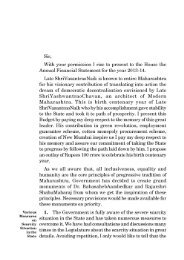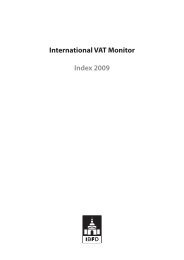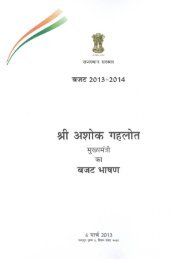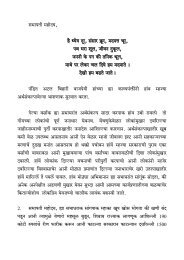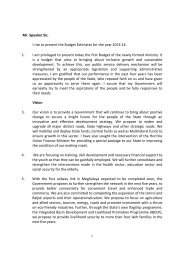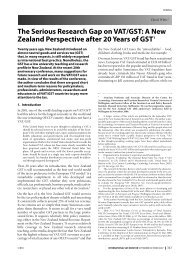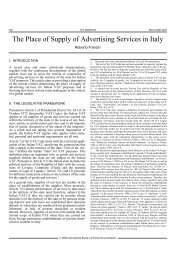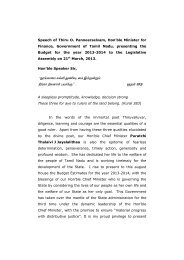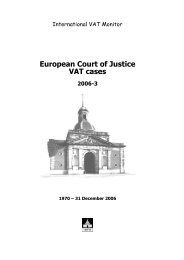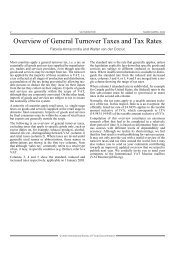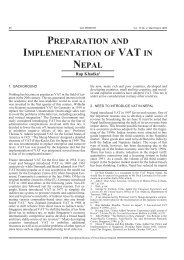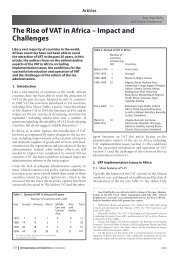ECJ VAT Cases MAY/JUNE 2007 - empcom.gov.in
ECJ VAT Cases MAY/JUNE 2007 - empcom.gov.in
ECJ VAT Cases MAY/JUNE 2007 - empcom.gov.in
You also want an ePaper? Increase the reach of your titles
YUMPU automatically turns print PDFs into web optimized ePapers that Google loves.
<strong>ECJ</strong> <strong>VAT</strong> <strong>Cases</strong><br />
(2) Art. 8(1)(a) of Sixth Directive 77/388 must be <strong>in</strong>terpreted<br />
as mean<strong>in</strong>g that the right to tax the supply<br />
and lay<strong>in</strong>g of a fibre-optic cable l<strong>in</strong>k<strong>in</strong>g two Member<br />
States and sited <strong>in</strong> part outside the territory of the<br />
Community is held by each Member State pro rata<br />
accord<strong>in</strong>g to the length of cable <strong>in</strong> its territory with<br />
regard both to the price of the cable itself and the<br />
rest of the materials and to the cost of the services<br />
relat<strong>in</strong>g to the lay<strong>in</strong>g of the cable.<br />
(3) Art. 8(1)(a) of Sixth Directive 77/388, read <strong>in</strong> conjunction<br />
with Arts. 2(1) and 3 of that Directive, must<br />
be <strong>in</strong>terpreted as mean<strong>in</strong>g that the supply and lay<strong>in</strong>g<br />
of a fibre-optic cable l<strong>in</strong>k<strong>in</strong>g two Member States is<br />
not subject to <strong>VAT</strong> for that part of the transaction<br />
which is carried out <strong>in</strong> the exclusive economic zone,<br />
on the cont<strong>in</strong>ental shelf and at sea.”<br />
Judgment of 19 April <strong>2007</strong>: Case C-455/05 Velvet &<br />
Steel Immobilien und Handels GmbH v. F<strong>in</strong>anzamt<br />
Hamburg-Eimsbüttel<br />
In September 1998, Burmeister Immobilien GmbH sold<br />
a plot of land with a rented apartment build<strong>in</strong>g. In July<br />
1999, two <strong>in</strong>dividuals together undertook a similar<br />
transaction. In the two sale contracts, the suppliers<br />
undertook to carry out the renovation work needed on<br />
the build<strong>in</strong>gs concerned. The two <strong>in</strong>dividuals also<br />
assumed a rent guarantee.<br />
After the sales, the suppliers concluded, on 25 September<br />
1998 and 12 July 1999 respectively, contracts with<br />
Velvet & Steel entitled “assignment of a part of the purchase<br />
price <strong>in</strong> return for assumption of obligations”. By<br />
those contracts, Velvet & Steel assumed responsibility<br />
for the suppliers’ obligation to renovate the build<strong>in</strong>gs as<br />
well as for the rent guarantee <strong>in</strong> return for a part of the<br />
purchase price of those build<strong>in</strong>gs. The two purchasers of<br />
the build<strong>in</strong>gs subsequently agreed to release Velvet &<br />
Steel from its obligations <strong>in</strong> return for payment to them<br />
of part of that fraction of the purchase price ceded to it.<br />
The profit result<strong>in</strong>g from that transaction, with regard to<br />
the contracts concluded with Burmeister and with the<br />
two <strong>in</strong>dividuals concerned, rema<strong>in</strong>ed with Velvet & Steel<br />
as “payment or lump-sum compensation/<strong>in</strong>demnity <strong>in</strong><br />
respect of any loss of profit”. Velvet & Steel declared only<br />
that profit as consideration for the services rendered, for<br />
<strong>VAT</strong> purposes.<br />
The tax adm<strong>in</strong>istration took the view that the assumption<br />
by Velvet & Steel of the obligation to renovate the<br />
build<strong>in</strong>gs was a service, which was subject to <strong>VAT</strong>. Velvet<br />
& Steel appealed aga<strong>in</strong>st that decision argu<strong>in</strong>g that neither<br />
of the two obligations which it had assumed had<br />
actually been carried out.<br />
In response to the question of the F<strong>in</strong>anzgericht Hamburg<br />
(Germany) of whether the concept of the assumption<br />
of obligations <strong>in</strong>cludes only pecuniary obligations<br />
or also the assumption of other obligations, such as service<br />
obligations, the <strong>ECJ</strong> (Third Chamber) declared on 19<br />
April <strong>2007</strong> that:<br />
“Art. 13(B)(d)(2) of Sixth Council Directive 77/388/EEC<br />
of 17 May 1977 on the harmonization of the laws of the<br />
Member States relat<strong>in</strong>g to turnover taxes – Common<br />
system of value added tax: uniform basis of assessment<br />
must be <strong>in</strong>terpreted as mean<strong>in</strong>g that the concept of<br />
assumption of obligations excludes from the scope of<br />
that provision obligations which are non-pecuniary,<br />
such as the obligation to renovate a property.”<br />
Court’s Orders<br />
Court’s Order of 6 March <strong>2007</strong>: Case C-168/06<br />
Ceramika Paradyż sp. z oo v. Dyrektor Izby Skarbowej<br />
w Łodzi<br />
In its monthly <strong>VAT</strong> return for September 2003,<br />
Ceramika Paradyż had reported the sale of a build<strong>in</strong>g for<br />
a net price of PLN 168,578 and PLN 36,427 <strong>in</strong> <strong>VAT</strong>. Due<br />
to a mistake <strong>in</strong> its <strong>VAT</strong> report<strong>in</strong>g system, the company<br />
declared the same transaction aga<strong>in</strong> <strong>in</strong> its <strong>VAT</strong> return for<br />
October 2003. After discovery of that mistake, the company<br />
decreased the turnover reported <strong>in</strong> its <strong>VAT</strong> return<br />
for November 2003 by PLN 168,578 and – as a result –<br />
<strong>in</strong>creased its excess <strong>in</strong>put tax claim by PLN 36,427.<br />
On discovery of the company’s mistake, the tax authorities<br />
reversed its corrections and imposed an additional<br />
tax liability of PLN 10,928 (30% of PLN 36,427). The tax<br />
authorities did not deny that Ceramika Paradyż was<br />
entitled to reclaim the amount paid through its return<br />
for October but took the view that it should have corrected<br />
its <strong>VAT</strong> return for October, not decreased its <strong>VAT</strong><br />
liability for November. Under the Polish <strong>VAT</strong> Law, the<br />
30% additional tax liability is imposed on taxable persons<br />
who have understated their output <strong>VAT</strong> liability or<br />
overstated their <strong>in</strong>put <strong>VAT</strong> claim <strong>in</strong> their <strong>VAT</strong> return.<br />
For a description of the legal background of the case, see<br />
the case note at pp. 227 of this issue.<br />
Ceramika Paradyż disputed the imposition of the additional<br />
tax liability and, <strong>in</strong> the course of the subsequent<br />
proceed<strong>in</strong>gs before the Wojewódzki Sąd Adm<strong>in</strong>istracyjny<br />
(the Regional Adm<strong>in</strong>istrative Court) <strong>in</strong> Łódź, that<br />
regional court referred two questions to the <strong>ECJ</strong> on the<br />
conformity of the national provision with Community<br />
law.<br />
Under Art. 104(3) of the <strong>ECJ</strong>’s Rules of Procedure, where<br />
the answer to a question referred to the <strong>ECJ</strong> for a prelim<strong>in</strong>ary<br />
rul<strong>in</strong>g may be clearly deduced from exist<strong>in</strong>g case<br />
law, the <strong>ECJ</strong> may, after hear<strong>in</strong>g the Advocate General, at<br />
any time give its decision by reasoned order <strong>in</strong> which<br />
reference is made to its previous judgment or to the relevant<br />
case law.<br />
In this context, the <strong>ECJ</strong> observed that, accord<strong>in</strong>g to the<br />
order for reference, the national court wished to know<br />
how the provisions of the First and Sixth Directives<br />
must be <strong>in</strong>terpreted for the purposes of its assessment of<br />
whether or not the provision of national law under<br />
which the additional tax liability is imposed is compatible<br />
with Community law. In the case at hand, that liability<br />
had been imposed by reason of an alleged <strong>in</strong>correct<br />
<strong>VAT</strong> return for a period (October 2003) prior to Poland’s<br />
accession to the European Union (1 May 2004). S<strong>in</strong>ce<br />
222 INTERNATIONAL <strong>VAT</strong> MONITOR <strong>MAY</strong>/<strong>JUNE</strong> <strong>2007</strong> © IBFD



